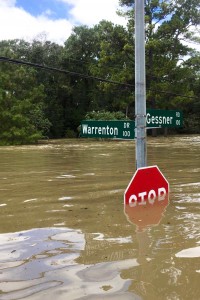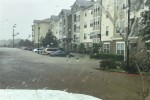This post was updated Sept. 1 at 5:35 p.m.
A motorboat helped Michelle Chung’s family and dogs evacuate through the flooded streets of Houston.
A neighbor driving the motorboat knocked on the door of her family’s flooded home, said Chung, a third-year cognitive science student. She added most people she knows evacuated by boat as well.
Chung, who was in Los Angeles during the storm, said she has experienced many storms while growing up in Houston. However, she said Tropical Storm Harvey brought the worst flooding her family has ever seen.
Chung added the storm flooded the homes of most of her high school friends and their families.
The National Hurricane Center classified Harvey as a Category 4 hurricane Friday, then downgraded it to a tropical depression Wednesday. Its slow movement caused extensive flooding in southeast Texas, especially in the Houston area, damaging more than 185,000 homes and leading to 46 deaths.
Juan Lora, a professor of the earth, planetary and space sciences, said both the record-setting amount of rainfall and infrastructure problems, such as poor rain drainage capacity, caused the flooding.
“What is specific (to Harvey) is it sort of stood still for a while,” Lora said. “The fact that (the storm) stayed over a certain region for a long time meant it caused more rain in general than a moving storm would cause.”

The storm has affected some UCLA students and alumni from the Houston area.
Alfred C. Hernandez, a UCLA alumnus who lives on the first floor of an apartment in Richmond, Texas – near Houston – said he is glad the rain did not damage his apartment.
“Sunday night, the water came very close to taking over our apartment. I had to park my two cars up on a hill within a complex,” Hernandez said. “It’s bad, the stress level of wondering whether your house would be overtaken.”
He added that although the streets near his home have flooded, he has plenty of food and water supplies.
Hernandez said he had to brave the rain and flooding when he traveled to the grocery store. He added that two people helped him bring his grocery cart back.
Todd Breeding, a UCLA alumnus who lives in Cypress, Texas – also near Houston – said although the first floor of his building flooded, the storm did not damage his apartment very much, and he did not lose power.
“Once the water recedes, (we) get back to work. There’s no repair for us, no rebuilding,” Breeding said. “It’s amazing how fast a city comes back.”
DeAnn Breeding, Todd Breeding’s wife, said she is not worried about the storm because she has made it through other storms before, such as Hurricanes Katrina and Ike in 2004 and 2008, respectively.
“Texas is banded together,” she said. “It’s been so organized – the rescue relief, no panic or crisis, no looting.”
Ibukun Olabinjo, a second-year psychobiology student from Sugar Land, Texas – just southwest of Houston – said the people of her community have faced weather events, such as heavy rains and tornadoes, in the past and have dealt with them by coming together and helping each other. She said she appreciates how the Houston community cares about its members.
“We’re sending out boats to rescue people individually. (There’s) not enough government help to rescue everyone; people … still need to be rescued from their homes,” Olabinjo said. “It will take a while, but Houston will bounce back.”
Some affected by the storm are concerned about the time, effort and money necessary to rebuild, however.
Chung said she is worried about the repairs her family will need to make to their flooded home.
“I know how much stress (my parents are) going to go through repairing the house, how much money they’re going to spend; (there’s) a lot that needs to be fixed. Me being (in Los Angeles) feels a bit helpless to that,” she said. “I want to be there to do the labor-intensive repair process.”

Chung added because she is in Los Angeles, communicating with her family in Houston has been difficult.
“For half the day or so my family was in (our) house, their phones died and there was no electricity,” she said. “That was tough, especially since we didn’t know if they prepared enough food to last. It was probably the toughest part.”
The National Hurricane Center issued a public advisory Wednesday that stated the threat of heavy rains ended in the Houston and Galveston, Texas, areas, but flooding will continue and Harvey will keep producing rainfall northeastward, toward western Kentucky.
